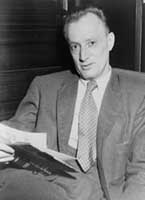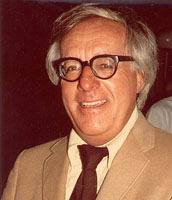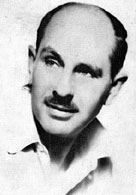
William Bruce Lincoln
Born: September 6, 1938 in Stafford Springs, Connecticut
Died: April 9, 2000 Pen Name: W. Bruce Lincoln Connection to Illinois: Lincoln taught at Northern Illinois University for more than 30 years. Biography: Lincoln was a prominent scholar of early 20th century Russian history. Lincoln graduated with his AB from the College of William and Mary in 1960 and his PhD from the University of Chicago in 1966.Lincoln taught at Memphis State University (1966-67) and Northern Illinois University (1967-99). Among his most prominent positions at NIU were:* Presidential Research Professor, 1982-1986 * University Research Professor, 1986-1990 * Distinguished Research Professor and NIU Foundation Professor for Russian History, 1990-1999 * Distinguished Research Professor Emeritus, 1999-Death
Awards:
Selected Titles
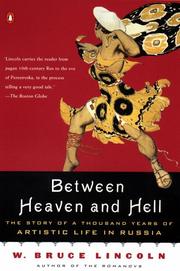 |
Between heaven and hell : ISBN: 0140267735 OCLC: 43273435 Penguin Books, New York : 1999. |
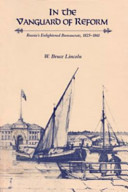 |
In the vanguard of reform : ISBN: 0875805361 OCLC: 605623115 Northern Illinois University Press, DeKalb : 1986. |
| In war's dark shadow : ISBN: 0195089537 OCLC: 30785971 Oxford University Press, New York : 1994, ©1983. |
|
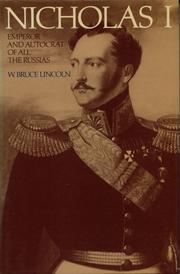 |
Nicholas I : ISBN: 0713908378 OCLC: 4184095 A. Lane, London : 1978. |
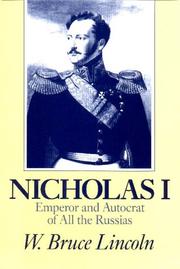 |
Nicholas I, emperor and autocrat of all the Russias / ISBN: 0875805485 OCLC: 20131960 Northern Illinois University Press, DeKalb, Ill. : 1989, ©1978. |
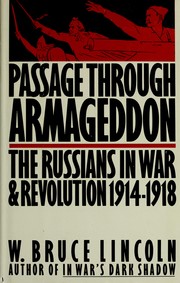 |
Passage through Armageddon : ISBN: 0671557092 OCLC: 13185809 Simon and Schuster, New York : ©1986. |
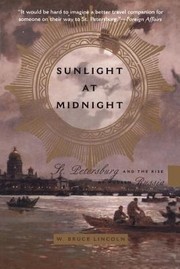 |
Sunlight at midnight : ISBN: 0465083242 OCLC: 45122873 Basic Books, Boulder, CO : ©2002. For Russians, St. Petersburg has embodied power, heroism, and fortitude. It has encompassed all the things that the Russians are and that they hope to become. Opulence and artistic brilliance blended with images of suffering on a monumental scale make up the historic persona of the late W. Bruce Lincoln's lavish "biography" of this mysterious, complex city. Climate and comfort were not what Tsar Peter the Great had in mind when, in the spring of 1703, he decided to build a new capital in the muddy marshes of the Neva River delta. Located 500 miles below the Arctic Circle, this area, with its foul weather, bad water, and sodden soil, was so unattractive that only a handful of Finnish fisherman had ever settled there. Bathed in sunlight at midnight in the summer, it brooded in darkness at noon in the winter, and its canals froze solid at least five months out of every year. Yet to the Tsar, the place he named Sankt Pieter Burkh had the makings of a "paradise." His vision was soon borne out: though St. Petersburg was closer to London, Paris, and Vienna than to Russia's far-off eastern lands, it quickly became the political, cultural, and economic center of an empire that stretched across more than a dozen time zones and over three continents. In this book, revolutionaries and laborers brush shoulders with tsars, and builders, soldiers, and statesmen share pride of place with poets. For only the entire historical experience of this magnificent and mysterious city can reveal the wealth of human and natural forces that shaped the modern history of it and the nation it represents. |
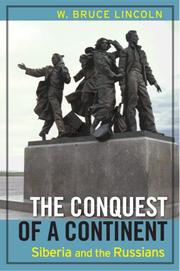 |
The conquest of a continent : ISBN: 0801489229 OCLC: 156912529 Cornell University Press, Ithaca, N.Y. : 2007. "In The Conquest of a Continent, the historian W. Bruce Lincoln details Siberia's role in Russian history, one remarkably similar to that of the frontier in the development of the United States. ... It is a big, panoramic book, in keeping with the immensity of its subject."--Chicago Tribune"Lincoln is a compelling writer whose chapters are colorful snapshots of Siberia's past and present. ... The Conquest of a Continent is a vivid narrative that will inform and entertain the broader reading public."-American Historical Review"This story includes Genghis Khan, who sent the Mongols warring into Russia; Ivan the Terrible, who conquered Siberia for Russia; Peter the Great, who supported scientific expeditions and mining enterprises; and Mikhail Gorbachev, whose glasnost policy prompted a new sense of 'Siberian' nationalism. It is also the story of millions of souls who themselves were conquered by Siberia. ... Vast riches and great misery, often intertwined, mark this region."-The Wall Street JournalStretching from the Urals to the Arctic Ocean to China, Siberia is so vast that the continental United States and Western Europe could be fitted into its borders, with land to spare. Yet, in only six decades, Russian trappers, cossacks, and adventurers crossed this huge territory, beginning in the 1580s a process of conquest that continues to this day. As rich in resources as it was large in size, Siberia brought the Russians a sixth of the world's gold and silver, a fifth of its platinum, a third of its iron, and a quarter of its timber. The conquest of Siberia allowed Russia to build the modern world's largest empire, and Siberia's vast natural wealth continues to play a vital part in determining Russia's place in international affairs. Bleak yet romantic, Siberia's history comes to life in W. Bruce Lincoln's epic telling. The Conquest of a Continent, first published in 1993, stands as the most comprehensive and vivid account of the Russians in Siberia, from their first victories over the Mongol Khans to the environmental degradation of the twentieth century. Dynasties of incomparable wealth, such as the Stroganovs, figure into the story, as do explorers, natives, gold seekers, and the thousands of men and women sentenced to penal servitude or forced labor in Russia's great wilderness prisonhouse. |
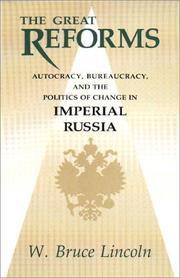 |
The great reforms : ISBN: 0875801552 OCLC: 21376939 Northern Illinois University Press, DeKalb, Ill. : 1990. The Great Reforms of the 1860s marked the broadest attempt at social and economic renovation to occur in Russia between the death of Peter the Great in 1725 and the Revolution of 1905. In just more than a decade, imperial reform acts freed Russia's serfs, restructured her courts, established institutions of local self-government in parts of the empire, altered the constraints that censorship imposed on the press, and transformed Russia's vast serf armed forces into a citizen army in which men from all classes bore equal responsibility for military service. This invaluable study explains why the legislation assumed the shape that it did and estimates what the Great Reforms ultimately accomplished. The Great Reforms offered readers a vital starting point from which to evaluate the prospects for glasnost', perestroika, and reform in the Gorbachev era. |
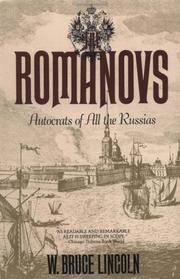 |
The Romanovs : ISBN: 0385279086 OCLC: 16354460 Anchor Press/Doubleday, Garden City, N.Y. : [1987], ©1981. Traces the history of the Romanov dynasty in Russia from the 1613 accession to the throne of Michael Feodorovich Romanov to the deaths of the last Romanovs during the Russian Revolution. |
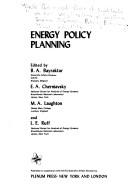 |
The Romanovs : ISBN: 0306406314 OCLC: 7172679 Dial Press, New York : ©1981. |
 |
The thinking reader ISBN: 0534505856 OCLC: 46976467 Wadsworth Pub., Belmont, CA : ©2002. |


